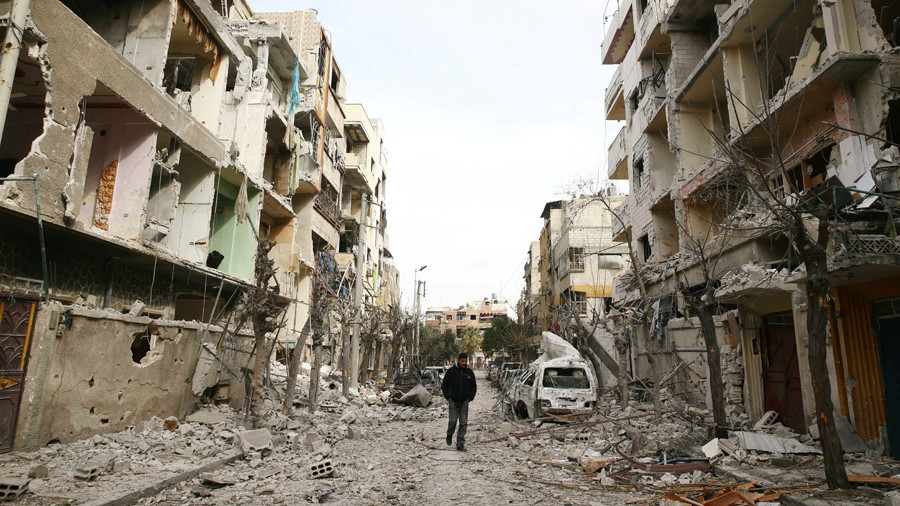‘Proof doesn't matter to West regarding Syria chemical weapons-use allegations… as usual’

It’s no coincidence the US is warning against chemical weapons use by Damascus, while the most likely source of an attack would be rebels, to trigger a response against the Syrian government, says former US diplomat Jim Jatras.
Amid calls for a ceasefire in eastern Ghouta, Syria, figures in Western media are accusing President Bashar Assad of launching a chemical gas attack.
Eastern Ghouta is just outside the capital, Damascus, and has been occupied by various rebel and terrorist groups for years. The violence there recently escalated, with both sides accusing each other of targeting civilians.
A humanitarian corridor set up by Russia opened in eastern Ghouta on Tuesday morning to allow civilians to leave the war-ravaged district. However, despite these efforts, it is feared civilians will be prevented by rebels from leaving the warzone.
RT America’s Ed Schultz spoke to former US diplomat Jim Jatras to discuss escalating tensions in the region.
RT: I don't think there's a story on the face of the Earth where Eastern media and Western media are reporting two completely different things. Last night CBS’s ‘60 Minutes’ ran a story and pinned all of the chemical use on the Syrian Army and Assad. However, Russia’s [Foreign Minister] Sergey Lavrov said that there's fake news in the Western media. Sort this out for us, as you know it tonight.
Jim Jatras: Actually, I think you just did that there is this gulf in what the facts are. And the sad fact is that the Western media do take their cues from Western governments. And even when there's no proof whatsoever. And there hasn't been proof that the Syrian government has used chemical weapons in this conflict, whether we're talking Ghouta in 2013 or whether we're talking about Khan Shaykhun in April of 2017, or now whatever is going on in Ghouta. It doesn't really matter, it seems, to Western governments. They make the accusation and the media just repeat it mechanically without demanding any proof or looking at the evidence.
RT: What is the next move you predict the US will make as far as policy is concerned? Assad is not backing off. The shelling by the militants is not stopping. What's the endgame here and what role does the US play in all of this? I know that the majority of American people don't want to see troops involved here, but unless they are, how's this going to end?
JJ: Unfortunately, there are three distinct flashpoints just within Syria. We have what's going on in Ghouta and it is somewhat encouraging that there was a resolution in the [UN] Security Council and looks like the US did not push a real hard line there. We agree on a ceasefire but it's not going to take place because all the terrorist groups that are in Ghouta are exempted. But we still have the problem with the Turks and the Kurds in Afrin and elsewhere in northern Syria. And we also have the major American concentration or presence in Syria, Kurdish controlled part of Syria where, remember, about a week or so ago we launched airstrikes on pro-government forces and killed an unknown number of Russians there. That's the real dangerous flashpoint, it seems to me.
The information we have from different sources that terrorist groups are planning now to use chemical weapons against Syrian civilians and [the] Syrian Army, and to accuse Syrian government. And again, we will have the same drama in the UNSC…And they will use this drama, this fake information to target [the] Syrian Army, as they were doing before.– Abdullah al-Ahmed, regional affairs researcher and political analyst
RT: Who is the number one backer of the rebels right now? Where are they getting their mortars? Where are they getting their equipment? Is it multifaceted?
JJ: It is still multifaceted. I don't think the Saudis and the Turks have walked away from their favorite terrorist groups. And I'll be honest with you, I'm afraid that we're still giving some support to some of these terrorist groups. It's no coincidence we are trying to defend them and are even warning against “chemical weapons used by the government,” even anybody who knows watching this that the most likely source of chemical weapons use would be precisely from the rebels in order to trigger a response against the Syrian government.
I wouldn’t be surprised if there are some reports saying that the Syrian Army used chemical weapons in order to justify any attack, any moves to derail [the] ceasefire in eastern Ghouta and to divert the attention from the humanitarian corridors or the efforts in order to isolate the civilians from radical armed groups which are controlling eastern Ghouta. It is expected.– Abdel Bari Atwan, author
RT: This ceasefire did not hold. What is your prediction that maybe a ceasefire would hold at some level?
JJ: I don't think it will. As I say the terrorist groups that are in Ghouta are exempt from the ceasefire. There was no date for the beginning of the ceasefire in the resolution. I think the real problem is the incoherence of Washington's policy: you have the president saying, on the one hand, “We're only there to fight [Islamic State or IS, formerly] ISIS,” but then he says in the same clause that the Russians, the Syrians and the Iranians are doing very bad things…We're certainly not there in eastern Syria to oppose ISIS, we’re there to block the Iranians and the Russians and to still demand that Assad must go.


0 Comments:
Post a Comment
Subscribe to Post Comments [Atom]
<< Home